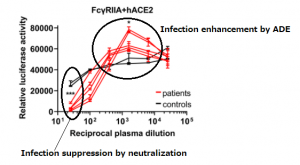A group from The Institute of Medical Science, The University of Tokyo, etc. has reported that Antibody-Dependent Enhancement of SARS-CVoV-2 infection to immune cells is real.
https://journals.asm.org/doi/10.1128/mBio.01987-21
Viruses infect cells mainly via specific receptors at the cell surface. Antibody-dependent enhancement (ADE) of infection is an alternative mechanism of infection for viruses to infect immune cells that is mediated by antibodies and IgG receptors (FcγRs).
Authors generated BHK cells stably expressing human FcγRs (FcγRIA, FcγRIIA, or FcγRIIIA) or human angiotensin-converting enzyme 2 (hACE2) (the entry receptor for SARS-CoV-2). Wild-type BHK cells lack human ACE2 expression and are not susceptible to SARS-CoV-2.
BHK cells were infected with a firefly luciferase-expressing vesicular stomatitis virus (VSV) lacking the VSV-G gene and pseudotyped with SARS-CoV-2 spike (VSV-SARS2-S). Although BHK-hACE2 cells were susceptible to VSV-SARS2-S, the BHK-FcγRIA, BHK-FcγRIIA, and BHK-FcγRIIIA cells were not susceptible due to the lack of hACE2. However, using convalescent-phase plasma from COVID-19 patients and incubated with VSV-SARS2-S, it was found that two types of FcγRs, FcγRIIA and FcγRIIIA, mediate ADE of SARS-CoV-2 infection in the presence of ACE2.
It was also confirmed that SARS-CoV-2 infection is enhanced by convalescent-phase plasma in primary macrophages.

